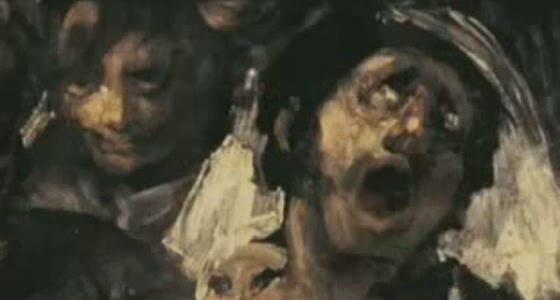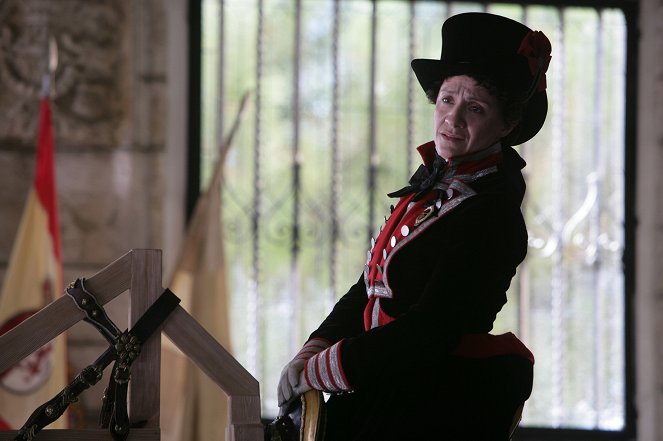Ohjaus:
Miloš FormanKuvaus:
Javier AguirresarobeSävellys:
Varhan Orchestrovič BauerNäyttelijät:
Javier Bardem, Natalie Portman, Stellan Skarsgård, Randy Quaid, José Luis Gómez, Michael Lonsdale, Blanca Portillo, Mabel Rivera, Unax Ugalde (lisää)Juonikuvaukset(1)
Vuonna 1792 inkvisitio vangitsee Goyan teini-ikäisen muusan Ineksen (Portman). Ines on rikkaan kauppiaan tytär, joka joutuu kevein perustein julman tuomioistuimen eteen. Goya (Skarsgård) on pakotettu anomaan viattomalle tytölle armoa vallanhimoiselta munkilta, Lorenzolta (Bardem). Ranskalainen vallankumous kaataa 15 vuotta myöhemmin inkvisition diktatuurin. Tuolloin Goyan luomikyky on voimakkaimmillaan, mutta hänestä on tullut kuuro. Yhä häntä vaivaavat Ineksen kauniit kasvot. (Nordisk Film Fin.)
(lisää)Videot (1)
Arvostelut (9)
As a TV production - okay, but as a full-blooded work by one of the best directors in the world? The sad, mediocre result stems from the miserable visuals, actors with almost nothing to act and primarily the dumb screenplay. This is made up of two absolutely disconnected parts, neither of which holds any water. The topic itself isn’t bad and the painter Goya, the Spanish Inquisition and the Napoleonic era certainly all have potential, but are absolutely unexploited. In the end, the movie contained something of all of the above, but together the result is nothing. Maybe Forman found himself forced to do a lot of cutting, but in that case the better half of the movie ended up on the cutting room floor. Let’s hope that they’ll release a director’s cut sometime. Overall it lacks energy (apart from two or three scenes) and staying power. The character of Goya is absolutely superfluous for the movie and so the only over-average element here is the soundtrack by Varhan Bauer. So the most powerful part of Goya’s Ghosts are the ending credits, when the camera gives us close-ups of details of Goya’s canvases and the orchestra starts to play full on.
()
The master made an error. A mushy and calculated screenplay, which tries to play at intellectual construction, completely soulless characters (only faint reflections of Forman’s former brilliance in a small character drawing), and a protruding to almost stale directing concept (especially the crowd scenes evoke cheap television productions). Goya is something like product placement – his name stands out nicely, but we can only dream that this is any sort of speculative psychology of genius, albeit simple but lively (Amadeus!). Milking emotions with Natalie Portman's grandma mask and Javier Bardem's satanic frown is not worthy of one of the greatest directors of recent decades. It truly isn’t. This is Forman’s first great mistake.
()
Against the backdrop of the shadowy side of modern Spanish history, Forman once again delivers his spectacular play. It is stunning with its sets, costumes, and, last but not least, an amazing atmosphere that breathes life into Goya's cruelly pessimistic paintings, worth experiencing for 120 minutes. The acting trio works perfectly with the director in their brilliantly acted parts. Stellan Skarsgård IS a Goya, Natalie is great like never before (and it's not just about getting naked here, as subliminal marketing everywhere proclaims), and Javier Bardem's mesmerizing demon literally destroys the screen with his performance. Forman is back in full force after seven years, once again mixing his genres properly, resulting in a stylish spectacle that may not grab you immediately, but resonates all the more when the credits roll.
()
Forget about the nobility of Valmont or the grandeur of Amadeo, this time the viewer is not enough to stare at how harsh it actually looked back then. Even to me, Goya as a whole appears so depressingly that I dare to say that I never want to see it again, because I probably wouldn't endure watching Natalie Portman on the torture rack a second time. And I say this despite the fact that for me, this film is undeniably high-quality, with excellent actors, a great script, and impressive music, and those two hours flew by without me even blinking. The only criticism, in the end, still belongs to Forman and is directed towards the final scene. This "song of death" is everything but impressive and chilling, which is a terrible shame compared to the previous plot.
()
I don't question the message and the strong idea Forman was trying to get across. I will make an odd analogy: while a film such an Amadeus is like a roasted turkey with delicate stuffing, crispy fried potatoes and a hearty vegetable garnish, accompanied a Sauvignon Blanc vintage 2004, Goya's Ghosts evokes a toast with garlic and a glass of sparkling mineral water. Nothing wrong with that, it will fill you up, but with a different end result for your taste buds :)
()



Mainos